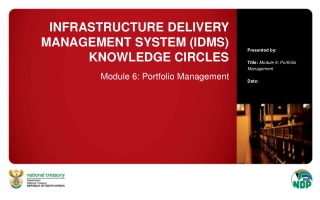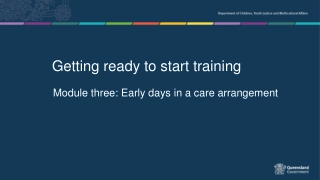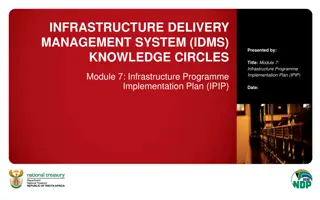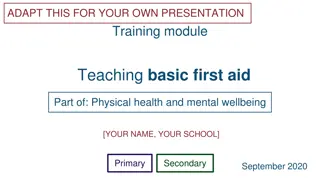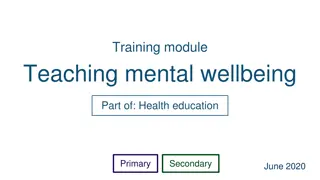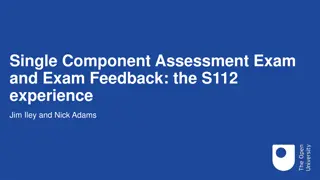
Unlocking Personal Finance Mastery: Budgeting Essentials and Financial Management Insight
Delve into the intricacies of personal finance through this enlightening session on budgeting fundamentals and financial planning. Understand the significance of budget creation, expense management, and the broader impact of macroeconomic factors on personal finances. Explore different budget types, key areas of budgeting, and the correlation between financial services and personal budgeting. Enhance your financial literacy and decision-making skills to better manage your financial resources.
Download Presentation

Please find below an Image/Link to download the presentation.
The content on the website is provided AS IS for your information and personal use only. It may not be sold, licensed, or shared on other websites without obtaining consent from the author. If you encounter any issues during the download, it is possible that the publisher has removed the file from their server.
You are allowed to download the files provided on this website for personal or commercial use, subject to the condition that they are used lawfully. All files are the property of their respective owners.
The content on the website is provided AS IS for your information and personal use only. It may not be sold, licensed, or shared on other websites without obtaining consent from the author.
E N D
Presentation Transcript
MODULE NO.4: BUDGETING: THE WHEREABOUTS OF MY MONEY
Before we start - what are the objectives of the session? a) Understand what a budget is in a wider sense: - State budget, Municipal/Regional budget, Business budget, Family/Personal budget b)Understand the importance of planning and decision-making with regards to personal finances; c) Be able to make quality financial decisions; d)Learn the main areas in the process of personal finance management e)Be able to create, edit, modify, adjust and monitor the implementation of a personal or family budget; f) Aquire basic macroeconomic knowledge; g) Be able to relate personal budgeting with basic financial services;
In todays session, we will cover the following topics: Basics of personal finance and budgeting What is budget and how it is related to the personal finances. What types of budgets exist and how to prepare its own budget Budgeting (Personal finance management) What are the key areas which need to be addressed in the budgeting process and how are macroeconomic variables influence personal finances. Financial services and personal budget How are financial products and services related to the personal finance management.
UNIT 1: BASICS OF PERSONAL FINANCES AND BUDGETING Financial planning and budgeting are activities that are applicable both at a high level (planning of a multi-billion budget for en entire state) and also for a simple person, student or a family (planning of 10 euros given by the parents to a student for 1 day).
PERSONAL FINANCES WHAT DOES IT MEAN? Personal finances can be defined as the finances we have for personal or family use . BUDGET WHAT IS IT? Budget is a financial review and a plan that includes mainly two parts income and expenses, for a certain defined period commonly one year. BUDGETING WHAT IS IT? Budgeting on the other hand is an activity aimed at managing a certain budget, either personal, family, business or wider. Personal (or family) budgeting can also be referred to as personal finance management .
TYPES OF BUDGET Type Main income Taxes source of Main expenditures Public Public works, health, judicial and educational system, public protection, social security etc Municipal/regional investments, education, local infrastructure Operational expenditures (for raw materials or similar), employee salaries, etc. Utilities, food, housing, taxes etc. State budget Public Taxes Regional/Municipal budget Private Operational revenues (sales) Business budget Private Monthly salary/wage Family/Personal budget
TASK 1: PREPARE YOUR BUDGET Use the same template (as provided in the Content of the module) to prepare your personal (or family) monthly budget; Tips: Choose any month you want; Prepare the budget before the month starts; Measure the difference between the incomes and expenses.
FINANCIAL PLANNING The budget (whatever the type) is firstly a financial plan, and therefore it is a dynamic, rather than a static element. Being a plan, it is clear that there may be deviations from the initial estimations, both on the side of the incomes (loss of job, increase/decrease of wage etc.) and on the side of expenses (unplanned expense, inflation etc). This is why, financial planning is en essential skill to be learned in order to be able to create an initial budet. Three pre-conditions for creating a realistic financial plan: Analysis of current financial situation Setting financial objectives Setting financial needs
DECISION-MAKING REGARDING PERSONAL FINANCES Decisions regarding financial matters are part of the everyday life. To decide, means to take action, without knowing the final outcome with certainty. That is why decision-making is a valuable skill that needs to be learned by young people, to gain more confidence and be more prepared when making an important decision. Notice that, whether we are speaking about incomes or expenses, there are various important decisions that need to be made. Especially at young age, everyone decides go to university or start to work (or both); to choose major in Matematics or Social Sciences; to go on a holiday or save the money etc. All these decisions influence the life and future of everyone that is why people need to start making decisions as early as possible, but always base those decisions on realistic parametars and reliable information.
TASK 2: CASE STUDY Assumption: You are 18 years. Next year you need to go to University and study what you are really good at: Information Technology. However, for a year of study, you need 3.000 euros, and your parents can afford only 1.000 eur. Make a decision: Quit going to University; Go to University, but work in the meantime 10 hours per day; Do a research and get a loan (together with your parents) at least to finance the first year; Other Note: Elaborate your decision and explain its effect, not only from a quantitative, but also from a qualitative perspective
UNIT 2: BUDGETING - PERSONAL FINANCE MANAGEMENT Budgeting is an activity aimed at managing a certain budget, either personal, family, business or wider. Personal budgeting is the activity aimed at managing a family or a personal budget, and it can also be reffered to as personal finance management .
MAIN AREAS IN THE PERSONAL FINANCE MANAGEMENT PROCESS Term Short definition Income(s) Financial earnings at an individual or family level, expressed in money; Financial spendings at an individual or family level, expressed in money; Difference between the first two, only when incomes are higher than expenses (Income > Expenses) A financial investment what we can do with part (or the entire) savings A financial loan from an institution (most commonly banks), that serve to fill the financial gap, in case expenses are higher than incomes (Income < Expenses). Expense(s) Savings Individual investments Loans
PERSONAL & FAMILY BUDGETING A personal budget is a plan and a review of the incomes and expenses of one person in a defined period of time. However one thing is important the personal budget is not a static document, but rather a dynamic one! A family budget is the same as personal but includes people that are part of the family (which ussually share their incomes and expenses). The individual budget consists mainly of: - Income(s); - Expenses; Both variables may be estimated in the budget, but they may change due to unanticipated internal factors (the laptop broke down, a new one is required) or external factors (ex. Loss of job).
PERSONAL & FAMILY BUDGETING Being able to create a personal & family budget and further to adjust, implement and take corrective actions is of utmost importance for any individual! Task 3 Budgeting Review your budget prepared in task 1. Assumption: An event you didn t estimate occurred your laptop broke down and it cannot be fixed. You need your laptop both for personal and educational use, so this is regarded as highly necessary for you. The laptop you need costs 450 eur. Sit down and re-write your budget. Allocate funds for a new laptop, either by cutting some expenses or by adding new income(s), or both. You can even include a minor loan. Note: If this is not applicable for your budget, you can use the budget for family N, given above, using the same (or similar) assumption (for example: their laundry machine broke down and it costs 400 eur.)
MACROECONOMIC VARIABLES IN PERSONAL FINANCIAL CONTEXT We live in a connected world, with mostly open economies. What each person does regarding personal finances, reflects on the economy as a whole. Review the following macroeconomic variables: Term Short definition Macroeconomics a science that deals with the study of aggregate economic variables, that is, the functioning of the economy as a whole; The term unemployment refers to a situation where a person actively searches for employment but is unable to find work. Simply put, gross domestic product (GDP) is the total monetary or market value of all the final goods and services produced within a country in a specific time period, usually one year. Economic growth Changes in the value of GDP from one year to another are measured through the "economic growth" indicator. The economic growth rate shows the changes of GDP value in one year, compared to the previous one. Economic growth rate is expressed in % and can be positive (if the value of GDP is increased) or negative (if the value of GDP is decreased). Macroeconomics Unemployment Gross domestic product (GDP)
MACROECONOMIC VARIABLES IN PERSONAL FINANCIAL CONTEXT Term Short definition Consumption The purchase of goods and services by individuals for final use! Savings The money saved by individuals and companies that constitute the investment capacity in the economy (the total money deposited in banks and other financial institutions) Investments The total amount invested by individuals, companies and the state in capital investments; Inflation A macroeconomic variable which results in increased general price level, measured through the customer price index (CPI). With inflation, the purchasing power of money decreases and corrective actions should be taken by each individual/family
INDIVIDUAL FINANCIAL DECISIONS AND THE ECONOMY AS A WHOLE Consumption If only one person decides to buy a new TV today, it will have almost no impact at all on the total demand for TVs. However, if 50% of households in the country decide to buy new TVs in one single day then this action will have a serious impact on the economy as a whole. Savings If only person decides to withdraw their deposit from the bank today, there will be almost no impact on the total deposit base in the country. However, if 50% of individuals/households decide to withdraw their deposits, then this will have a serious (negative) impact on the financial sector in the country! Investments If only one person today decides to invest its saved money in the financial sector (either in banks, investments funds or other financial institutions), there will be almost no impact on the total investment capacity of the economy. However, if 50% of families decide to include its saved money in the financial sector (in any form), then this will almost certainly have a high impact on the investment capacity of the entire economy.
Task 4 Case study Assumption 1: You have 2.500 euros saved and you intend to by a car worth 5.000 euros, by getting a loan from a bank, for the entire amount of the car. You are employed, with an average monthly income. You don t owe a car, so you need it for personal use. Assumption 2: The country is in the middle of financial crisis and interest rates for consumer loans have increased from an average of 3.5% to an average of 6.8% in the last three months. Economists predict that it will take at least 1 year for interest rates to return to the previous level. Make a decision: Delay the idea of buying a car for at least 6 months and then make a new assessment; Use your savings for the half of the car and borrow the other half from the bank; Go on as initially planned (with borrowing the entire amount from the bank); Other option (list and elaborate); Elaborate and explain your decision.
UNIT 3: FINANCIAL SERVICES AND PERSONAL BUDGET Financial services (and products) are a rather complex subject, that include many financial products, institutions as well as different financial markets. For a more detailed review of the financial services please see Module 3: Financial services A walk-through .
BASIC FINANCIAL SERVICES Financial services (and products) are a rather complex subject, that include many financial products, institutions as well as different financial markets. For a more detailed review of the financial services please see Module 3: Financial services A walk-through . The following financial services & products are considered to be basic: - Deposits for natural person (individuals) - Consumer loans The following can be concluded: When a person deposits money, the Bank pays interest for the money on disposal, while the individual receives interest (mostly at the end of the year). On the opposite, when an indivial gets a loan from a Bank, the obligation for paying the interest is on behalf of the individual person.
BANKS AS FINANCIAL INSTITUTIONS Banks are the most common financial institutions in many countries, as well as worldwide. Its basic function is from one side to gather deposits, while from another side to provide loans (for individuals and companies). The price for both these services (saving or borrowing money) is the Interest rate Interest rate on deposits Paid by the Bank, to the Beneficiary Interest rate on loans Paid by the borrower(s), to the Bank Task 5: Case study Choose any bank from your country. Do a research and find out the following: What is the interest rate offered by the bank for a term deposit for 1 year? What is the interest rate for getting a consumer loan with a payback period of 5 years? Compare the two interest rates. Which one is higher? Elaborate your answer and explain any eventual differences.
TO BE CONTINUED.. Module 5: Financial literacy and work-life

